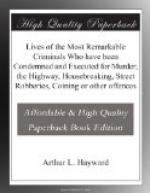The order of things requires that I should first of all take notice how the Law comes to have a right of punishing those who live under it with Death or other grievous penalties, and this in a few words arises thus. We enter into society for the sake of protection, and as this renders certain laws necessary, we are justly concluded by them in other cases for the protection of others; but of all the criminal institutions which have been settled in any nation, never was any more just, more reasonable, or fuller of clemency, than that which is called the Crown Law in England. In speaking of this it may not be improper to explain the meaning of that term, which seems to take its rise from the conclusion of indictments, which run always contra pacem dicti domini regis, coronam et dignitatem suam (against the peace of our Sovereign Lord the King, his Crown and Dignity) and therefore, as the Crown is always the prosecutor against such offenders, the Law which creates the offence is with propriety enough styled the Crown Law.
The first head of Crown Law is that which concerns offences committed against God, and anciently there were three which were capital, viz., heresy, witchcraft and sodomy; but the law passed in the reign of King Charles the Second for taking away the writ de Haeretica comburendo, leaves the first not now punishable with death, even in its highest degree. However, by a statute made in the reign of King William, persons educated in the Christian religion who are convicted of denying the Trinity, the Christian religion, or the authority of the Scriptures, are for the first offence to be adjudged incapable of office, for the second to be disabled from suing in any action, and over and above other incapacities to suffer three years’ imprisonment. As to witchcraft, it was formerly punished in the same manner as heresy. In the time of Edward the Third, one taken with the head and face of a dead man and a book of sorcery about him, was brought into the King’s Bench, and only sworn that he would not thenceforth be a sorcerer, and so dismissed, the head, however, being burnt at his charge. There was a law made against conjurations, enchantments and witchcraft, in the days of Queen Elizabeth, but it stands repealed by a statute of King James’s time, which is the law whereon all proceedings at this day are founded. By this law, any person invoking or conjuring any evil spirit, covenanting with, employing, feeding, or rewarding them, or taking up any dead person out of their grave, or any part of them, and making use of it in any witchcraft, sorcery, etc., shall suffer death as a felon, without benefit of clergy, and this whether the spirits appear, or whether the charm take effect or no. By the same statute those who take upon them by witchcraft, etc., to tell where treasure is hid, or things lost or stolen should be found, or to engage unlawful love, shall suffer for the first offence a year’s imprisonment, and stand in the pillory once every




